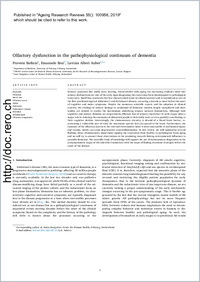Olfactory dysfunction in the pathophysiological continuum of dementia
- Bathini, Praveen Department of Medicine, University of Fribourg, Switzerland
- Brai, Emanuele VIB-KU Leuven Center for Brain & Disease Research, Laboratory for the Research of Neurodegenerative Diseases, Leuven, Belgium
- Alberi, Lavinia Department of Medicine, University of Fribourg, Switzerland - Swiss Integrative Center of Human Health, Fribourg, Switzerland
-
01.11.2019
Published in:
- Ageing Research Reviews. - 2019, vol. 55, p. 100956
English
Sensory capacities like smell, taste, hearing, vision decline with aging, but increasing evidence show that sensory dysfunctions are one of the early signs diagnosing the conversion from physiological to pathological brain state. Smell loss represents the best characterized sense in clinical practice and is considered as one of the first preclinical signs of Alzheimer’s and Parkinson’s disease, occurring a decade or more before the onset of cognitive and motor symptoms. Despite the numerous scientific reports and the adoption in clinical practice, the etiology of sensory damage as prodromal of dementia remains largely unexplored and more studies are needed to resolve the mechanisms underlying sensory network dysfunction. Although both cognitive and sensory domains are progressively affected, loss of sensory experience in early stages plays a major role in reducing the autonomy of demented people in their daily tasks or even possibly contributing to their cognitive decline. Interestingly, the chemosensory circuitry is devoid of a blood brain barrier, representing a vulnerable port of entry for neurotoxic species that can spread to the brain. Furthermore, the exposure of the olfactory system to the external environment make it more susceptible to mechanical injury and trauma, which can cause degenerative neuroinflammation. In this review, we will summarize several findings about chemosensory impairment signing the conversion from healthy to pathological brain aging and we will try to connect those observations to the promising research linking environmental influences to sporadic dementia. The scientific body of knowledge will support the use of chemosensory diagnostics in the presymptomatic stages of AD and other biomarkers with the scope of finding treatment strategies before the onset of the disease.
- Faculty
- Faculté des sciences et de médecine
- Department
- Médecine 3ème année
- Language
-
- English
- Classification
- Biological sciences
- License
-
License undefined
- Identifiers
-
- RERO DOC 327719
- DOI 10.1016/j.arr.2019.100956
- Persistent URL
- https://folia.unifr.ch/unifr/documents/308493
Statistics
Document views: 117
File downloads:
- pdf: 1354
